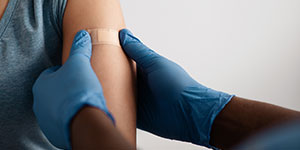 Hands of a doctor in protective gloves puts band aid to inculcate site to patient in clinic." />
Hands of a doctor in protective gloves puts band aid to inculcate site to patient in clinic." /> Hands of a doctor in protective gloves puts band aid to inculcate site to patient in clinic." />
Hands of a doctor in protective gloves puts band aid to inculcate site to patient in clinic." />
More than 15 years of data show that HPV vaccination provides safe, effective, and long-lasting protection against cancers caused by HPV infections. Research shows that healthcare professionals are parents’ most trusted source of information about the HPV vaccine.
CDC encourages healthcare professionals to recommend HPV vaccination in the same way and on the same day that they recommend other vaccines for adolescents.
This page summarizes CDC's current HPV vaccine recommendations. Access the official, full text below:
ACIP Recommendations on HPV and other MMWR articles. Advisory Committee on Immunization Practices (A.
Dec. 11, 2023HPV vaccination prevents new HPV infections but does not treat existing HPV infections or diseases. HPV vaccine works best when given before any exposure to HPV.
Most sexually active adults have already been exposed to HPV, although not necessarily all of the HPV types targeted by vaccination. At any age, having a new sex partner is a risk factor for getting a new HPV infection. People who are in a long-term, mutually monogamous relationship are not likely to get a new HPV infection.
Routine vaccination Age 11-12 years; can be started at age 9 years Catch-up vaccination Age 13-26 years, if not adequately vaccinated Shared clinical decision-making Some adults ages 27-45 years, if not adequately vaccinatedTwo doses of HPV vaccine are recommended for most people starting the series before their 15th birthday.
Three doses of HPV vaccine are recommended for teens and young adults who start the series at ages 15 through 26 years, and for immunocompromised persons.
HPV vaccines are very safe. Scientific research shows the benefits of HPV vaccination far outweigh the potential risks. Like all medical interventions, vaccines can have some side effects.
All vaccines used in the United States, including HPV vaccines, go through extensive safety testing before the U.S. Food and Drug Administration (FDA) licenses them. During clinical trials before the licensure, the 9-valent HPV vaccine Gardasil 9 was studied in more than 15,000 males and females and was found to be safe and effective.
Keep Reading: HPV Vaccine Safety & Effectiveness DataNo serious adverse events have been associated with any HPV vaccine. Ongoing monitoring is conducted by CDC and the Food and Drug Administration.
Syncope (fainting) can occur after any medical procedure, including vaccination. Adolescents should be seated or lying down during vaccination and remain in that position for 15 minutes after vaccination. This is to prevent any injuries that could occur from a fall during a syncopal event.
The most common adverse reactions reported during clinical trials of HPV vaccines were local reactions at the site of injection. In prelicensure clinical trials, local reactions such as pain, redness, or swelling were reported by 20% to 90% of recipients.
A temperature of 100°F during the 15 days after vaccination was reported in 10% to 13% of HPV vaccine recipients. A similar proportion of placebo recipients reported an elevated temperature. Local reactions generally increased in frequency with increasing doses. However, reports of fever did not increase significantly with increasing doses.
A variety of systemic adverse reactions have been reported by vaccine recipients, including nausea, dizziness, myalgia, and malaise. However, these symptoms occurred with equal frequency among both HPV vaccine and placebo recipients.
Contraindications and precautions to vaccination generally dictate circumstances when vaccines will not be given.
Human Papillomavirus Chapter of Pinkbook: (Epidemiology and Prevention of Vaccine-Preventable Diseases)